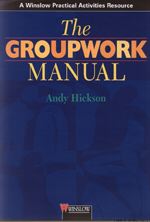 by Andy Hickson
by Andy Hickson
This manual answers many common questions and offers almost 100 practical groupwork activities. It takes the user through a range of exercises, ideas, pitfalls and descriptions and avoids the use of jargon.
Full Description:
This resource is intended for anyone who runs or participates in group sessions. This manual answers many common questions and offers almost 100 practical groupwork activities. It takes the user through a range of exercises, ideas, pitfalls and description and avoids the use of jargon. Following the general introduction to groupwork, the main section of the book is devoted to methods, techniques and presentation. This includes warm-up and closure activities as well as games and exercises for exploring difficulties. Each activity is photocopiable and clearly laid out, showing at a glance the aims, time, materials and preparation required, including a detailed description of the procedure with suggestions for variations. Ideas are offered on how to work with people with learning disabilities. The author also discusses about optimum conditions for carrying out groupwork, recounts inspiring casework anecdotes and shows how to evaluate your practice. Sample Activity Role-play 1Aim: Exploring how others feel Time: 5 minutes Materials and preparation: None Activity: The leader asks the group to form a circle and asks those in the group that have difficulty interacting with each other to step into the centre. A typical situation is then chosen where these people are likely to have difficulties with each other. Very often it could be some kind of confrontation, such as asking someone to stop doing something. This scenario is then enacted in front of the group, with people in the centre of the circle taking on the roles of those with whom they are having difficulty. In this enactment people improvise their new character; for example, if there are two people, they will be playing each other's roles. The group leader should let this go on for as long as is appropriate, while making sure that the actors know that what they are doing is role-playing and not real life. Variation: Improvise possible solutions. Do they work? Closure: The leader talks to the actors about how they feel. What was it like being presented with yourself? Were the characterizations realistic? What did the group feel watching it? Ask the actors to shake hands and leave behind the characters they have just played in the circle.
132 pages; 9 X 12;spiral bound
ISBN:
Forward Acknowledgement Part 1 Introduction to groupwork - Introduction
- Why do we work in groups?
- Principles and procedures
- The nature of groups
- Leadership
- Choosing a group
- Sensitive groups
- Different groups
- Overcoming difficulties
- Learning to be with people
- The voice
Part 2 Methods, techniques and presentation - Methods, techniques and presentation
- watming up
- Closures
- Games and exercises for exploring difficulties
- Games exploring words and misinterperation
Part 3 Appendices Working with people with a learning disabilityOptimum conditionsCasework anecdotesEvalutationLast wordsUseful addressses Index of activities
In-Stock- Usually ships in 20-30 business days!
|